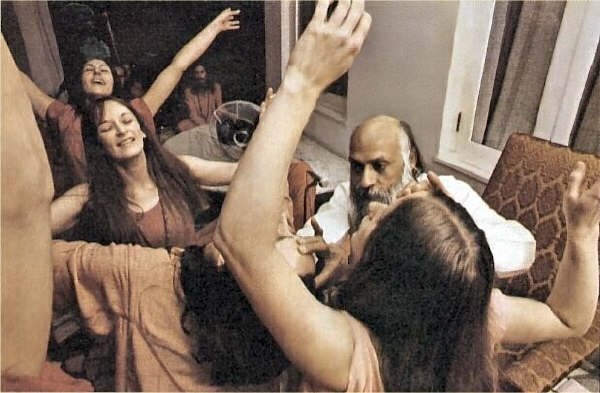THE EDUCATION THAT has prevailed in the past is very insufficient, incomplete, superficial. It only creates people who can earn their livelihood but it does not give any insight into living itself. It is not only incomplete, it is harmful too — because it is based on competition.
Any type of competition is violent deep down, and creates people who are unloving. Their whole effort is to be the achievers: of name, of fame, of all kinds of ambitions — obviously, they have to struggle and be in conflict for them. That destroys their joys and that destroys their friendliness. It seems everybody is fighting against the whole world.
Education up to now has been goal-oriented: what you are learning is not important; what is important is the examination that will come a year or two years later. It makes the future important — more important than the present. It sacrifices the present for the future. And that becomes your very style of life; you are always sacrificing the moment for something which is not present. It creates a tremendous emptiness in life.
The commune of my vision will have a five-dimensional education.
Before I enter into those five dimensions, a few things have to be noted. One: there should not be any kind of examination as part of education, but every day, every hour, observation by the teachers; their remarks throughout the year will decide whether you move further or you remain a little longer in the same class. Nobody fails, nobody passes — it is just that a few people are speedy and a few people are a little bit lazy — because the idea of failure creates a deep wound of inferiority, and the idea of being successful also creates a different kind of disease, that of superiority.
Nobody is inferior, and nobody is superior.
One is just oneself, incomparable.
So, examinations will not have any place. That will change the whole perspective from the future to the present. What you are doing right this moment will be decisive, not five questions at the end of two years. Of thousands of things you will pass through during these two years, each will be decisive; so the education will not be goal-oriented.
The teacher has been of immense importance in the past, because he knew he had passed all the examinations, he had accumulated knowledge. But the situation has changed — and this is one of the problems, that situations change but our responses remain the old ones. Now the knowledge explosion is so vast, so tremendous, so speedy, that you cannot write a big book on any scientific subject because by the time your book is complete, it will be out of date; new facts, new discoveries will have made it irrelevant. So now science has to depend on articles, on periodicals, not on books.
The teacher was educated thirty years earlier. In thirty years everything has changed, and he goes on repeating what he was taught. He is out of date, and he is making his students out of date. So in my vision the teacher has no place. Instead of teachers there will be guides, and the difference has to be understood: the guide will tell you where, in the library, to find the latest information on the subject.
In the future the computer is going to prove of tremendous, revolutionary importance.
For example, the way education is imparted to students is utterly old-fashioned. It still depends on feeding the memory; and the more the memory is loaded, the less is the possibility of clarity and intelligence. I take it as a great opportunity that students can be freed from storing all kinds of information. They can carry small computers which will have all the information they need at any moment. That will help their minds to be more meditative, clear, innocent. Now their minds are too cluttered with unnecessary rubbish.
In the future, education will be centralized on computer and on TV, because what can be seen graphically is more easily remembered than what is read or heard. Eyes are far more powerful instruments than ears, or anything else. And it takes away the boredom of reading and listening. On the contrary, TV becomes a joyful experience. Geography can be taught very colorfully….
The teacher should be only a guide to show you the right channel, to show you how to use the computer, how to find the latest book. His function will be totally different. He is not imparting knowledge to you, he is making you aware of the contemporary knowledge, of the latest knowledge. He is only a guide.
With these considerations, I divide education into five dimensions.
The first is informative, like history, geography, and many other subjects which can be dealt with by television and computer together.
But about history — we have to take a completely radical standpoint. Right now history consists of Genghis Khan, Tamerlane, Nadirshah, Adolf Hitler, etc. These are not our history, these are our nightmares. Even the idea that human beings can be so cruel to other human beings is nauseating. Our children should not be fed with such ideas.
In the future, history should consist only of those great geniuses who have contributed something to the beauty of this planet, to humanity — a Gautam Buddha, a Socrates, a Lao Tzu; great mystics like Jalaluddin Rumi, J. Krishnamurti; great poets like Walt Whitman, Omar Khayyam; great literary figures like Leo Tolstoy, Maxim Gorky, Fyodor Dostoevsky, Rabindranath Tagore, Basho.
We should teach the positive grandeur of our inheritance, with footnotes about the people who have been counted up to now as historically great men — people like Adolf Hitler. They can have only a place in footnotes, or an appendix, with a clear explanation that they were either insane or suffered from some inferiority complex or other psychiatric disorder.
We have to make the future generations completely aware that a dark side existed in the past and dominated the past, but now there is no place for that side.
In the first dimension also come languages. Every person in the world should know at least two languages; one is his mother tongue, and the other is English as an international vehicle for communication. They can also be taught more accurately by television — the accent, the grammar, everything can be taught more correctly.
We can create in the world an atmosphere of brotherhood: language connects people and language disconnects too. There is right now no international language. This is due to our prejudices. English is perfectly suitable, because it is known by more people around the world on a wider scale.
The second is the inquiry of scientific subjects, which is tremendously important because it is half of reality, the outside reality. They can be imparted by television and computer too, but they are more complicated, and the human guide will be more necessary.
And the third will be what is missing in present-day education, the art of living. People have taken it for granted that they know what love is. They don't know…and by the time they know, it is too late. Every child should be helped to transform his anger, hatred, jealousy, into love.
An important part of the third dimension should also be a sense of humor.
Our so-called education makes people sad and serious. And if one third of your life is wasted in a university in being sad and serious, it becomes ingrained; you forget the language of laughter — and the man who forgets the language of laughter has forgotten much of life.
So love, laughter, and an acquaintance with life and its wonders, its mysteries…. These birds singing in the trees should not go unheard. The trees and the flowers and the stars should have a connection with your heart. The sunrise and the sunset will not be just outside things – they should be something inner, too. A reverence for life should be the foundation of the third dimension. People are so irreverent to life.
The fourth dimension should be of art and creativity: painting, music, craftsmanship, pottery, masonry — anything that is creative.
All areas of creativity should be allowed; the students can choose. There should be only a few things compulsory — for example, an international language should be compulsory; a certain capacity to earn your livelihood should be compulsory; a certain creative art should be compulsory. You can choose through the whole rainbow of creative arts, because unless a man learns how to create, he never becomes a part of existence, which is constantly creative. By being creative one becomes divine; creativity is the only prayer.
And the fifth dimension should be the art of dying.
In this fifth dimension will be all the meditations, so that you can know there is no death, so that you can become aware of an eternal life inside you. This should be absolutely essential, because everybody has to die; nobody can avoid it. And under the big umbrella of meditation, you can be introduced to Zen, to Tao, to Yoga, to Hassidism, to all kinds and all possibilities that have existed, but which education has not taken any care of.
The new commune will have a full education, a whole education.
I have been a professor myself and I resigned from the university with a note saying: This is not education, this is sheer stupidity; you are not teaching anything significant.
But this insignificant education prevails all over the world — it makes no difference, in the Russia or in America. Nobody has looked for a more whole, a total education. In this sense almost everybody is uneducated; even those who have great degrees are uneducated in the vaster areas of life. A few are more uneducated, a few are less — but everybody is uneducated, because education as a whole does not exist anywhere.
Osho Vision,
The Greatest Challenge: the Golden Future
Education: Forward to the Real Basics
***OSHO: New Five-Dimensional Education for a New Earth:
http://www.facebook.com/group.php?gid=69265303749




